| Srl | Item |
| 1 |
ID:
127311


|
|
|
|
|
| Publication |
2014.
|
| Summary/Abstract |
Americans still believe their country is unique but are less convinced it has a special responsibility to lead. This has both domestic and international implications.
|
|
|
|
|
|
|
|
|
|
|
|
|
|
|
|
| 2 |
ID:
127325


|
|
|
|
|
| Publication |
2014.
|
| Summary/Abstract |
After 34 years, the Carter Doctrine remains valid. But there are cheaper and more effective ways of keeping the oil flowing than unilateral deployment of military force.
|
|
|
|
|
|
|
|
|
|
|
|
|
|
|
|
| 3 |
ID:
127308


|
|
|
|
|
| Publication |
2014.
|
| Summary/Abstract |
America's Middle East policy has been a haphazard blend of hard-headed realism, idealism and dispensationalist theology. The result has not served US interests well.
|
|
|
|
|
|
|
|
|
|
|
|
|
|
|
|
| 4 |
ID:
127329
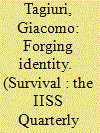

|
|
|
|
|
| Publication |
2014.
|
| Summary/Abstract |
A more prominent and direct European role in the protection of cultural heritage and promotion of the arts could revitalise an exhausted integration process.
|
|
|
|
|
|
|
|
|
|
|
|
|
|
|
|
| 5 |
ID:
127331
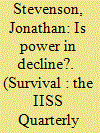

|
|
|
|
|
| Publication |
2014.
|
| Summary/Abstract |
The title of Moisés Naím's new book, The End of Power, is unabashed hyperbole. By the evidence he adduces, the ongoing dispersal of power will entail undramatic and evolutionary adjustments.
|
|
|
|
|
|
|
|
|
|
|
|
|
|
|
|
| 6 |
ID:
127324


|
|
|
|
|
| Publication |
2014.
|
| Summary/Abstract |
Libya's current woes were not pre-ordained, but its politics are caught in a vicious circle. Those who created the crisis are the only ones who can resolve it.
|
|
|
|
|
|
|
|
|
|
|
|
|
|
|
|
| 7 |
ID:
127318
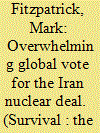

|
|
|
|
|
| Publication |
2014.
|
| Summary/Abstract |
One thing that is clear about the interim nuclear deal with Iran, reached on 24 November in Geneva, is that much of the world supports it. Nearly 70 nations have expressed that support formally. Nations liked that it capped Iran's programme, averted prospects for war, and showed light at the end of the sanctions tunnel. When members of the US Congress talk about legislating what a final deal with Iran must achieve, they ought to consider that the other parties to the negotiation also have a vote.
|
|
|
|
|
|
|
|
|
|
|
|
|
|
|
|
| 8 |
ID:
127320


|
|
|
|
|
| Publication |
2014.
|
| Summary/Abstract |
Conflicts between religious groups are hardly new. But the latest round of sectarian violence arises not from religious doctrine but in large part from the weakness of governments and institutions.
|
|
|
|
|
|
|
|
|
|
|
|
|
|
|
|
| 9 |
ID:
127313
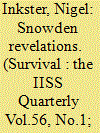

|
|
|
|
|
| Publication |
2014.
|
| Summary/Abstract |
The stream of revelations about US communications-intercept operations deriving from material purloined from the National Security Agency (NSA) by rogue contractor Edward Snowden has aroused strong emotions in a variety of constituencies. Civil-liberties groups concerned with issues of personal freedom and data privacy have expressed alarm about the pervasive nature of the NSA's bulk data collection. States that have been shown to have collaborated with the organisation in such collection have been embarrassed. And countries that considered themselves to have friendly relations with the United States but were the subject of its covert intelligence collection have reacted with varying degrees of outrage. Some of this outrage has been real, but much of it is manufactured for either domestic political reasons or in the hope of leveraging some policy advantage from the discomfiture of the US and its allies. The major US technology companies and service providers which have to varying degrees collaborated with the NSA, either voluntarily or in response to judicial warrants, have experienced a decline in customer trust, with uncertain but potentially significant implications for their future business prospects.
|
|
|
|
|
|
|
|
|
|
|
|
|
|
|
|
| 10 |
ID:
127326
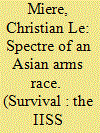

|
|
|
|
|
| Publication |
2014.
|
| Summary/Abstract |
Procurement programmes in Asia appear to be focused on asymmetric relationships and defensive strategies of denial rather than control. The result may not resemble the classical security dilemma.
|
|
|
|
|
|
|
|
|
|
|
|
|
|
|
|
| 11 |
ID:
127316
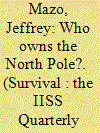

|
|
|
|
|
| Publication |
2014.
|
| Summary/Abstract |
On 9 December 2013 Canadian Minister of Foreign Affairs John Baird announced that Ottawa was deferring its expected submission to an obscure UN commission with regard to mineral rights on and below parts of the Arctic Ocean seabed to ensure that the eventual submission 'includes Canada's claim to the North Pole'. According to Canadian media reports, the claim that had been prepared for submission by scientists and civil servants did not include the pole, and was therefore vetoed by Prime Minister Stephen Harper. The following day, Russian President Vladimir Putin told his defence ministry, in televised remarks, to 'devote special attention to deploying infrastructure and military units in the Arctic' - a statement widely interpreted as a direct response to the Canadian action.
|
|
|
|
|
|
|
|
|
|
|
|
|
|
|
|